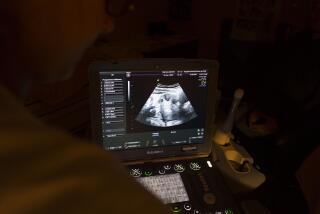Wilson Favors Use of Birth Control Implant : Family planning: Governor hopes to make Norplant device widely available to teen-agers and drug users.
- Share via
SACRAMENTO — Gov. Pete Wilson said Thursday he is moving toward making a controversial new birth control implant widely available to teen-agers and to drug-abusing women of childbearing age.
Wilson, in an interview, said he does not believe teen-agers would need their parents’ consent to use the device. And he said he and his staff “haven’t decided” whether to make the treatment mandatory for drug users.
His first priority, Wilson said, is to make sure that any poor teen-ager or drug abuser who wants the device, known as Norplant, can get it.
Wilson said the device has “a number of virtues,” including the fact that it requires little or no attention from the user once it is inserted under her arm by a physician or nurse.
“You don’t have to remember to take a pill,” the governor said. “You don’t have to insert a diaphragm.”
The Republican governor said he expects the device, designed to prevent conception for five years after it is inserted, to be “widely sought by sexually active young adults who don’t want to become pregnant.”
Although it has been approved by the Food and Drug Administration, use of the device has been limited by its cost--estimated at $600 to $700 for the device and insertion--and the fact that few gynecologists have been trained to implant them.
Wilson’s idea of making Norplant more accessible represents a further step in his effort to reverse the birth control policies of his Republican predecessor, George Deukmejian, who cut the family-planning budget by two-thirds one year and tried to limit the program’s mission to providing only information, not contraceptive devices.
Wilson, in contrast, has proposed adding $10 million to the Office of Family Planning’s $36-million budget, some of which may go toward providing Norplant to poor women and teen-agers. Already, the Department of Health Services is negotiating with Norplant’s manufacturer to bring down the cost of the device.
Ken August, a spokesman for the Health Services Department, said Medi-Cal administrators hope to make the product available by late summer. When the device is added to the list of state-approved treatments, it will be available free to Medi-Cal clients and for a modest co-payment, probably around $100, at state-subsidized family planning clinics.
Wilson might be playing with political fire if he suggests requiring some women, even drug abusers, to have the implant inserted. Mandatory medical procedures are vehemently opposed by both conservative and liberal advocates of individual freedoms.
Norplant already has been the subject of considerable controversy in recent months. A judge in Visalia ordered a child-abusing mother of four to have the device implanted, and a Philadelphia newspaper suggested in an editorial that it could be used to reduce the population of the poverty-stricken “underclass.”
Margaret Crosby, an American Civil Liberties Union lawyer representing the woman in the Visalia case, said Thursday that her organization would support making Norplant available on a voluntary basis to as many women as possible. But Crosby said she has concerns about the potential for subtle coercion of poor women and is outright opposed to any direct order from the government requiring women to use the device.
“Any coercive use of Norplant is an extraordinary invasion of privacy,” Crosby said. “Birth control options should always be freely chosen by individuals and not used as a method of control or punishment by the state.”
On the other end of the political spectrum, Wilson can expect to take heat from some in his own party for proposing an expansion of birth control, which many conservatives believe promotes promiscuity.
Tom Minnery, director of public policy for Focus on the Family, a conservative Pomona think-tank, said Wilson would be sending the wrong message by making it easier or more convenient for young women and girls to have sex.
“I’d much rather his message be, ‘Don’t do sex,’ ” Minnery said. “Just like I’m sure he would say ‘Don’t do drugs.’ There’s too much heartache, too much illness, that results from casual sex of people who aren’t mature.”
But Wilson clearly is intrigued by Norplant’s potential to make a dent in the soaring cost of the state’s health and welfare services, which the governor believes are being fueled by teen pregnancies and “crack babies.” He apparently thinks the device’s long-term effects can overcome the carelessness or ignorance of young people--male and female--who are failing to prevent unwanted pregnancies.
Wilson has brought up Norplant in several recent conversations with state lawmakers, and Democratic Assembly Speaker Willie Brown said the governor “wanted to dwell” on the topic for 10 or 15 minutes during their last face-to-face meeting.
Wilson also broached the subject in a meeting with The Times editorial board on Wednesday and then clarified his thoughts in a separate interview Thursday. He said he supports the teaching of abstinence but believes such a policy has only limited effectiveness.
“I really think that is going to be more effective in the home and the family,” he said. “The problem is, you’ve got some homes where it will not be taught, where it will not be part of the child’s ethic. You’ve got sexually active young adults. Whether that pleases me or not, it’s a fact.”
Wilson and Administration officials said existing law allows unmarried teen-agers to obtain devices such as Norplant without the consent of their parents. “I think that we’ve got to make it available,” Wilson said.
“That’s ironic. If parents were doing a better job, were more involved in their children’s lives,” unwanted teen pregnancies would not be so prevalent, Wilson added.
As for drug abusers, Wilson said his Administration is “exploring” making the device available to any woman who has had one crack baby--an infant born addicted to the potent form of cocaine. Many of these babies are born disabled and suffer learning problems.
“I think to the extent you can prevent the birth of an addicted newborn, who can be terribly and irreversibly damaged, God knows you want to do that,” Wilson said.
Asked if he would consider requiring the implant’s use among drug abusers, Wilson said, “Frankly, we haven’t decided.”
He added: “At the very least, it ought to be available to anybody who wants it.”
BACKGROUND
The contraceptive Norplant won federal approval in December, 1990, but has been used by half a million women worldwide since 1970. It consists of six plastic capsules, surgically implanted in the upper arm, that release a synthetic hormone already used in birth control pills. By blocking ovulation and passage of sperm through the cervix, Norplant is said to be 99% effective. Its side effects are similar to those of birth control pills.
ABORTION DRUG: New Hampshire lawmakers offer their state as a test site for the French drug RU-486. A4
More to Read
Get the L.A. Times Politics newsletter
Deeply reported insights into legislation, politics and policy from Sacramento, Washington and beyond. In your inbox twice per week.
You may occasionally receive promotional content from the Los Angeles Times.











